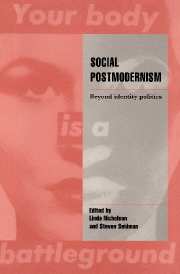Introduction
Published online by Cambridge University Press: 29 October 2009
Summary
It is perhaps ironic that the very intellectuals thought to have originated postmodern theory – we mean of course Baudrillard, Foucault, and Derrida (Lyotard being the exception) – have refused this characterization of their work. It is again not entirely without paradox that postmodern theory has found its most welcoming reception and home not in France but in the United States – the nation of pragmatism, empiricism, and a much vaunted liberal consensus. And notwithstanding Rorty's liberal pragmatic version of postmodernism, it is among the American left, among neo- and-post-Marxists, feminists, queers, and Third World and postcolonial intellectuals, that postmodernism has been most enthusiastically embraced. Why have Americans, mostly left academic intellectuals but also some outside America (for example, in Britain and Australia) come to advocate a politics and social theory in a postmodern mode?
We think that this is an important question but it cannot be productively engaged by approaching postmodernism in an ahistorical way. Postmodernism is best spoken about in the plural and its meaning best clarified by understanding those who use it in a particular social and discursive setting. So, we submit two stories, our stories, of “why postmodernism.” Of course, we know that these are not the whole story or the only ones – indeed they are not even the only stories we could tell but they are, we hope, stories that are suggestive beyond the tales of two left American academic intellectuals.
Why postmodernism: Steve's story
Before I was a postmodernist, I was a Marxist. Why the change? My “conversion” pivoted on my disillusionment with Marxism which broadened into a disenchantment with key aspects of the Western Enlightenment tradition.
- Type
- Chapter
- Information
- Social PostmodernismBeyond Identity Politics, pp. 1 - 36Publisher: Cambridge University PressPrint publication year: 1995
- 12
- Cited by



